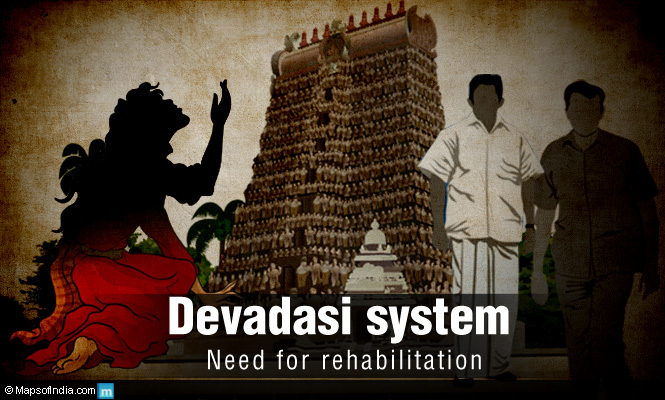In spite of being made illegal by the Government of India way back in 1988, the devadasi system exists even today in some southern States of India and prostitution continues in the name of religion. Under the system, disadvantaged girls are forced into flesh trade and these devadasis are indeed a cursed community.
What is devadasi system?
The word ‘devadasi’ originates from two Sanskrit words: ‘Deva’ meaning God and ‘Dasi’ meaning a female servant. As the name suggests, devadasi is a young woman who dedicates her life into the service of God. This system is prevalent in India since time immemorial. In ancient times, girls were married off to Gods or deities of the temples. As a result, they were not allowed to marry anyone else and they had to devote their entire life in the service of God. Traditionally, they danced in the temple premises and were considered as reincarnation of the courtesans in the court of Lord Indra and other Devas. However, in reality, they became the sexual interests of the priests of the temples, the kings, zamindars, and other high profile men. In short, a devadasi became a common property for all high-ranking men in ancient kingdoms and towns.
The system continues even today
This so-called religious belief continues even today in modern India. It is followed in southern and eastern India, including Odisha, Andhra Pradesh, Karnataka, Tamil Nadu and devadasis are known by various names like mahari in Odisha, basivi in Karnataka, matangi in Maharashtra, joginis, venkatasani, muralis, nailis, theradiyan etc. Male domination, religious practices, caste system and poverty have all been considered as the factors behind the perpetuation of this system. Even today, parents ‘marry’ off their little daughters to deities and temples. These girls are forced into prostitution to serve the men of the rich and upper caste communities and she cannot enter into a real marriage.
Plight of devadasis
The devadasis lead a miserable life. They quench the sexual thirsts of the so-called rich and higher class men. In the name of God and religion, many poor parents thrust their young daughters into the system so that they could avoid giving dowry. Some of the unfortunate children are too young to understand what exactly is happening to them. They are not allowed to marry anyone else. They are not allowed to work outside the temple either. In the morning they spent their time by cleaning the temple and decorating the altars and shrines, singing and dancing, and collecting coins from the visitors of the temple to support themselves. At nights, they are transformed into prostitutes. These devadasis face discrimination on the basis of caste. They are powerless and weak women who suffer from severe poverty, exploitation and oppression. They also become victims of HIV and AIDS.
Prohibition of devadasi system
The first legal initiative to prohibit the system started way back in 1934 in Mumbai, Bombay that time, under the Bombay Devadasi Protection Act. According to this Act, the system was declared illegal. The devadasis were allowed to marry. Any person found taking the services of a devadasi was considered guilty and could face a year’s imprisonment, a fine or both. The 1934 Act also aimed at protecting the interests of the devadasis. In 1947, the Madras Devadasi (Prevention of Dedication) Act outlawed this practice of dedicating the girls to the temples in the southern Madras Presidency. In 1988, the devadasi system was completely outlawed all over India. Yet, it still exists. The practice is followed in the families of the poor, untouchables, dalits and the lower castes. According to a report, there are 45,000 devadasis in India today.
Where has the Government failed?
The reason behind its prevalence is that there has not been any proper remedies and motivation in order to eradicate the system. The Government should come up with alternative income generation programmes which the devadasis can take up and support themselves. No facilities are there for counselling as well as provision of proper medical care for the victims. There has also been no awareness programmes on HIV/STD prevention in areas which practise devadasi system.
Yes, it is true that eliminating the devadasi system has not been easy. Not only the Government, even various NGOs, local volunteers and social workers have come forward to help the victims. Some of the efforts have been successful in helping the devadasis get out of the clutches of this religious practice and lead their own independent lives. But most of the unfortunate victims have not been that lucky. Such a heinous system in the name of God has no place in a modern and civilised society.
Related Information:
How Traditions are Trumping Law in TN Over Jallikattu Bull Sport




